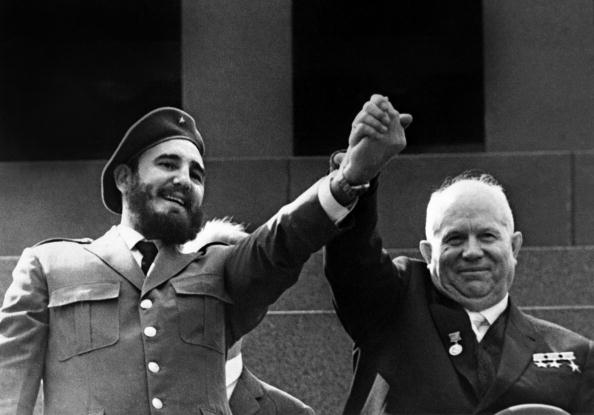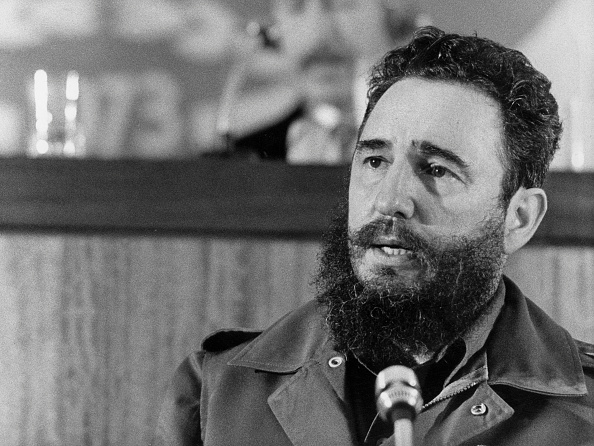This is how Fidel Castro persecuted gay people

Cuban revolutionary Fidel Castro has died aged 90 – prompting strong debate about his time in power that included the rounding up, persecution and murder of LGBT people.
Homosexuals were viewed as inherently counter-revolutionary and homosexuality was declared a “deviation incompatible with the revolution” by Castro’s regime.
LGBT people, particularly gay men, were routinely sent to prison without charge or trial by the state.
In 1965, the regime established prison work camps known as Military Units to Aid Production (UMAP), where homosexuals, Jehovah’s Witnesses, and other “undesirable” peoples deemed out of line with the Communist ideology were forcefully sent.
Many received false telegrams telling them they had been called for military service and should appear at a chosen location – where they would then be rounded into trains, trucks and buses and sent to the camps with little food or water.
Reports from those who experienced the era say that police would also round people up on the streets, targeting men who looked “effeminate” or like “hippies”.
Homosexuals and men who were perceived to be homosexual were separated and put into camps apart from other detainees.
Those who experiences the labour camps report being beaten, threatened with execution, stuffed with dirt in their mouths, buried in the ground up to their neck, and tied up naked outside in barbed wire without food or water until fainting.
According to an official state newspaper report in 1966, the labour camps were the idea of Fidel Castro himself, after seeing similar examples on a visit to the Soviet Union, and were enacted by current Cuban President, Raul Castro.
In a documentary aired on HBO, one trans woman says she has to wear sunglasses for her whole life after her eyes were bleached with acid thrown in her face while incarcerated.
There were thought to be 200 such camps across Cuba until their abolition in 1968.

Extreme oppression of gay Cubans continued after the UMAPs: being sent to prison for homosexual acts, fired from their jobs and banned from joining the Communist Party.
Many former camps continued under the guise of ‘military training’ with a wage equivalent to the cost of one meal a month, and gay men still forced to work in them.
Some who had been sent to the camps for being gay had their government ID cards branded to say they had been incarcerated, preventing them from seeking any future employment or education.
Respected writer Reinaldo Arenas wrote of the treatment he and other gay Cubans faced in prison: “It was a sweltering place without a bathroom.
“Gays were not treated like human beings, they were treated like beasts.
“They were the last ones to come out for meals, so we saw them walk by, and the most insignificant incident was an excuse to beat them mercilessly.”
Castro routinely referred to gay men as “faggots” and “worms” for many decades in public comments.
Many artists and writers had initially supported the ideas of Castro, welcoming the expected freedom of a more egalitarian society – but shortly into the regime LGBT people were kicked out of their jobs in the arts and media, and their publications shut down.
LGBT students were expelled from university and gay people prohibited from having contact with children and young people.
Meanwhile, during the 1970s, young boys perceived as effeminate were forced to undergo therapy in an attempt to change their behaviour.

Homosexual acts were eventually made legal in Cuba in 1979, but that did little to end the prejudice and state sanctioned oppression that had taken hold during the previous two decades.
During the 1980s, large numbers of LGBT Cubans fled the island to live in Miami and other parts of the US, where spontaneous celebrations were seen following the news of Castro’s death.
It’s reported that many were forced to leave Cuba – threatened with military service much like the earlier labour camps if they refused to migrate.
Up until 1993 Cubans who were HIV positive, which included many men who have sex with men, were put in quarantines that one World Health Organisation official said were nothing more than “pretty prisons”.
According to a Human Rights Watch report, “the government [in 1997] … heightened harassment of homosexuals, raiding several nightclubs known to have gay clientele and allegedly beating and detaining dozens of patrons.”
Reports say those who visited LGBT venues and meeting places were arrested, fined, or threatened with imprisonment and even beaten up by police officers up until the late ’90s.
There was a significant change in government policy in recent years, with Cuba’s high quality healthcare system providing free gender re-assignment surgery and quality services for those with HIV.
Castro said he had not paid enough attention to the issue of homophobia, claiming: “At the time we were being sabotaged systematically, there were armed attacks against us, we had too many problems.”
The daughter of current President, Raul Castro, and niece of Fiden Castro, has been a strong advocate for LGBT rights.
She even voted against one government bill because of a lack of protections for gender identity.
Herb Sosa, a Cuban-American who heads the Miami-based LGBT group Unity Coalition, told the Washington Blade: “I would never be happy about anyone’s death – anyone.
“But the long-awaited passing of one of the Castro monsters that have imposed nearly six decades of oppression, pain and death to so many Cubans does bring a certain closure for many.”

